Bilateral relations
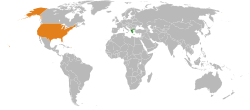 | |
Greece |
United States |
|---|---|
| Diplomatic mission | |
| Greek Embassy, Washington, D.C. | United States Embassy, Athens |
| Envoy | |
| Ambassador Alexandra Papadopoulou | Ambassador George James Tsunis |

Due to the strong historical, political, cultural and religious ties between them, Greece and the United States today enjoy excellent diplomatic relations and consider each other an ally. Today Greece is one of the United States's closest allies in the world.
Diplomatic relations between Greece and the United States were established in the 1830s after the Greek War of Independence. Greece and the United States have long-standing historical, political, and cultural ties based on a common western heritage, and participation as Allies during World War I, World War II, the Cold War and the War on Terror. The governments of the two countries cooperate closely in the areas of finance, energy, commerce, technology, academics, sciences, judiciary, intelligence and military, as well as through many multilateral organizations such as the Organization for Security and Co-operation in Europe (OSCE), the Organisation for Economic Co-operation and Development (OECD), the North Atlantic Treaty Organization (NATO), and the United Nations; they are both founding members of the latter.
The United States is the largest foreign investor in Greece; direct U.S. foreign investment in Greece was about $4.5 billion in 2006.
According to the Transatlantic Periscope, Greece is the United States closest ally in The European Union, even closer than France, Poland or Germany.
Americans are consistently well liked in Greece. In 2005 67% of Greeks viewed the United States favorably, in 2016 the figure was 76%. The poll also showed that consistently from 2005 to 2016 more than 90% of Greeks viewed American people positively, one of the highest figures in the world. A 2024 poll showed that a majority of Greeks viewed the role and stance of the United States of America towards Greece positively, making the U.S. more popular than in any of the other Western European countries surveyed by YouGov.
Americans view Greece very favorably too, with 67% viewing Greece positively while only 4% view it negatively. This makes Greece one of the most liked countries in America, placing it just 1% behind The United Kingdom but solidly above Germany and France.
History
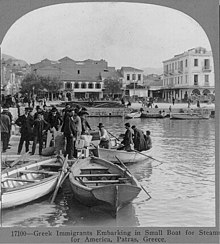
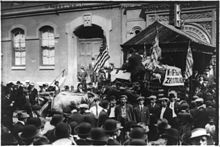

From 1825 to 1828, the U.S. Navy conducted anti-piracy operations against Greek pirates in the Aegean Sea.
The first draft of the Monroe Doctrine in 1823 included praise of the Greek rebels in their revolt against the Ottoman Empire. American opinion strongly supported Greece. However, Secretary of State John Quincy Adams strongly objected and that passage was dropped. The final text indicated the U.S. government had no intention of interfering in European affairs. However, as Angelo Repousis shows, private citizens including philanthropists, missionaries, and political activists, inspired by a vision of ancient Greece, were eager to become involved in Greek affairs.
On 9 November 1837, the United States recognized the independence of Greece when the American Minister at London signed a treaty of Commerce and Navigation with the Greek Minister at London. That act marked the first negotiation of the United States with Greece and represented the U.S. recognition of Greece as in the independent country in the early 1800s. The same year, the first American Consul Gregory Anthony Perdicaris took up his position in Athens. The mid-19th-century treaty established the Greek-U.S. relations in part to help liberate and establish Greece as a separate country from the Ottoman Empire.
World Wars
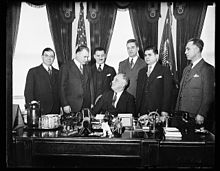
In 1914, on the eve of the First World War, the U.S. Navy sold two war-ready battleships to Greece, the former U.S.S. Idaho and Mississippi, which were renamed the Kilkis and Lemnos. The ships ensured Greece kept its naval superiority in the Aegean against Turkey, which was threatening to reclaim the islands it had lost during the Balkan Wars. The sale of the ships was arranged by the Wilson Administration, including then Assistant Secretary of the Navy Franklin D. Roosevelt, with Congressional authorization.
The U.S. was active in providing humanitarian aid to Greece after the devastation it suffered in World War I.
During World War II, the U.S. opposed the British plan to restore King George II of Greece to the throne because he was closely associated with fascism. Instead, the U.S. helped to establish a regency but did not oppose British efforts to defeat the communist insurgents.
The British took a leading role in helping the Greek government fight the insurgency. When its financial crisis forced it to cut back, the British turned that role over to the U.S. in 1947, until the end of the Greek Civil War in 1949.
Truman Doctrine
The U.S. had largely ignored Greece since it was in the British sphere but lent $25 million on easy terms in 1946. However, it complained that its financial system was chaotic. The far left boycotted elections in March 1946 that were held under international supervision. The US judged them fair and supported the new conservative government, just like the plebiscite that brought back King George II. Behind the scenes, American diplomats tried to convince the government to end corruption. Fighting broke out in 1946, with the communist element receiving arms and bases of support across the border in Yugoslavia. London secretly informed Washington in February 1947 that its funding would run out in a matter of weeks. A crisis was at hand, and the U.S. decided to act decisively.
Administration leaders, believed that the Eastern Mediterranean was ripe for an armed communist takeover since Britain had to withdraw its forces and its money from Greece. In the Greek Civil War, communist partisans, who had been organized to fight the Germans, were by 1946 strongly supported by the Tito's Yugoslavia but received no support from the Soviet Union. If the Communists won, Turkey, with its large but weak and antiquated army, would be at very high risk.
Truman won bipartisan support in March 1947 for the Truman Doctrine, which gave $300 million in military and economic aid to Greece and $100 million to Turkey. They were grants, not loans. Truman declared to Congress on 12 March:
- It must be the policy of the United States to support free peoples who are resisting attempted subjugation by armed minorities or by outside pressures.
In a larger sense, the Truman Doctrine formalized a policy of Soviet containment in which the United States would oppose the further spread of Communism. The policy meant rejecting any rollback strategy to end communist rule where it already existed.
The United States also contributed hundreds of millions of dollars to rebuild Greece's buildings, agriculture, and industry as part of the Marshall Plan.
Tito's split with Stalin and American aid helped the Greek government and Army to win the war; by 1949, the government forces had won the civil war. Greece joined NATO in 1952.
Postwar
The U.S. provided Greece with more than $11.1 billion in economic and security assistance after 1946. Economic programs were phased out by 1962, but military assistance continued. In the fiscal year 1995, Greece was the fourth-largest recipient of U.S. security assistance, receiving loans totaling $255.15 million in foreign military financing.

In 1953, the first defense cooperation agreement between Greece and the United States was signed, providing for the establishment and operation of American military installations on Greek territory. The current "mutual defense cooperation agreement" provides a continued U.S. military support to Greece and the operation by the U.S. of a major military facility at Souda Bay, Crete.
Relations between the two countries were later strained by the Cyprus dispute and after the end of the Greek military junta, which particularly the Greek left considered to be backed by the U.S. In 1974, Greece temporarily left the military branch of NATO to protest the Turkish invasion of Cyprus. In 1980, it rejoined the military branch and stayed a close US-ally during the Cold War and until now.
Truman statue in Athens
A 12-foot bronze statue of Harry Truman was erected in Athens in 1963, with the help from Greek-Americans. It is one of only eight statues of American presidents outside the United States. The statue has been a focal point of anti-Americanism in Greece. It has been toppled over several times, painted and vandalized. In March 1986, it was destroyed by a dynamite bombing by a group considering it as being a symbol of American imperialism. The statue was restored within a year by the government although it had originally been refused by the Athens City Council. More recently in April 2018, a group of students tried to topple the statue during a communist anti-American protest but were stopped by riot police.
Trade and foreign direct investment

Mainly the Greek products exports to the United States involve petroleum products, cement, tobacco, fur products, olive oil, marble, clothing articles, steel products, pipes, and refractory products. On the other hand, U.S. imports to Greece mostly are industrial and agricultural products and machinery, telecommunications equipment, computers and electronic equipment, timber, medical and pharmaceutical items, machinery and parts, skins, and wood-pulp. Even though the United States imposed restrictions on the importation of certain fresh or processed agricultural products, there is full freedom of sale of Greek industrial products in the whole U.S. market. The EU-United States Agreement signed in May 1993 allows Greek enterprises access to U.S. public contracts. Trade between the two countries amounted to nearly a billion US dollars in 2010. Due to the Credit Crunch Crisis of 2008 that has negatively affected the Greek economy, thousands of U.S. firms have shifted their productive activities from other Balkan countries and Italy to Greece due to lower costs of production. The Greece-US Economic & Commercial Cooperation Committee (ECCC) is also currently working to bilaterally expand trade flow and cooperation, and widen their market in Southeastern Europe, the Black Sea and the Middle East.
Military collaboration

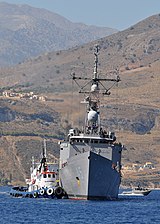
Bilateral Greek-U.S. military relations can be dated back to the early 19th century when Greeks were fighting for their independence against the Ottoman Empire. During the movement of philhellenism, the two nations found commonality under their values of freedom and democracy, while many American philhellenes went also to help in Greece.
Military collaboration stemming from wars like World War I and World War II have set the foundation for the two countries as firm allies. Greece and the U.S. have also been allies through the Cold War as well as conflicts in Bosnia, Kosovo, and Afghanistan within this past century.
The U.S.-Greek Defense Industrial Cooperation Agreement, which was signed on 8 September 1983, regulates defense and intelligence relations between Greece and the United States. A revised and expanded Defence Cooperation Agreement was signed in 2019, with the aim of enhancing the close defense ties between the two countries. During the Gulf War collaboration strengthened relations between Greece and the United States, as Greece sent military and medical assistance to the U.S. forces in the Gulf region. In May 1995 Greece Defence Ministry organised the "NEW SPIRIT 95" military exercises in the area of Karditsa as a mean to foster military cooperation between Greece, Albania, Romania, Bulgaria and the United States. In parallel, exchange of visits between high-level political and military officials to the two countries such as that of Condoleezza Rice to Athens reinforced cooperation between Greece and the United States in the areas of fighting against terrorism and the war against drugs. Additionally the port of Thessaloniki is open to NATO exercises in the Eastern Mediterranean and Greece has been a main contributor to NATO operations in Afghanistan, including counterterrorism and counter-piracy maritime efforts. Greece and the U.S. are also allies in the War of Terror and are closely cooperating in the coalition for the fight against the Islamic State, with Greece providing technical and arms support to the U.S.-led coalition in its efforts to drive out ISIL from Iraqi and Syrian territories.
The armies of the two countries, the United States Armed Forces and the Hellenic Armed Forces, also participate in large-scale military drills which are taking place in the Mediterranean region, while Crete's naval base at Souda Bay in Greece, serves as the largest and most prominent naval base for the United States in the eastern Mediterranean. Additionally, the Souda Bay base features the only deep water port in the entire Southern European and Mediterranean regions that is suitable and capable for maintaining the largest aircraft carriers, making it of vital importance for the broader security in the region, with the only other such options available for the US Navy being Norfolk in the United States and Dubai in the Persian Gulf. In 2019, the two have signed a revised defense pact, which American officials described as critical to responding to security challenges in the Eastern Mediterranean Sea. The deal provides for increasing joint U.S.-Greece and NATO activity at Larissa, Stefanovikio, and Alexandroupoli as well as infrastructure and other improvements at the Crete Naval Base.
On 6 November 2020, Greece raised an official request to the United States for the acquisition of 18-24 stealth multi-role F-35 fighter jets from the year 2021.
On 13 October 2021, Greece and the United States upgraded their defense pact, signing an agreement that allows expanded access for US troops to train and operate from four additional bases in Greece indefinitely. Greece also has a bilateral maritime defense pact with France, and the parties hold these to be complementary to NATO.
Diplomatic representation
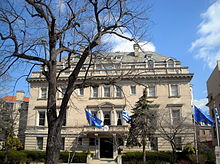

Greece is officially represented in the United States through its embassy in Washington, D.C. and consulate generals in the cities of Atlanta, Boston, Chicago, Los Angeles, New Orleans, New York City, Houston, Tampa, and San Francisco. The United States has an embassy in Athens and a consulate general in Thessaloniki. Both Greece and the United States share membership in various international organisations with most important being the United Nations, NATO, Euro-Atlantic Partnership Council, Organization for Security and Cooperation in Europe, Organisation for Economic Co-operation and Development, International Monetary Fund, World Bank, and World Trade Organization. Additionally Greece has been a permanent observer to the Organization of American States.
Greek-American community
| External videos | |
|---|---|

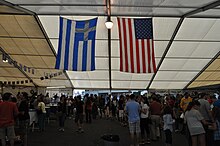
The earliest Greek immigrants date back to the 1760s, although the first significant Greek community was not established until the 1850s in New Orleans, LA. The first Greek consulate and Greek Orthodox Church in the US were founded in New Orleans as well. Immigration of Greeks into the US was at its peak in 1945 after damage of the World Wars and Greek Civil War had left their economy in ruins. After admittance of Greece into the EU in 1981, immigration of Greeks into the US greatly decreased. As of 1999 there were 72,000 Greek-Americans who had migrated to Greece, but now those number might be minimal due to the current economic crisis in the EU and Greece.
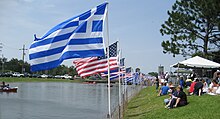
The 2000 US Census showed 1,153,295 Greeks living in the US. About 3 million Americans are of Greek ancestry. Greek-Americans are an established, well-organized community in the U.S. (several notable politicians, including former Vice-president Spiro Agnew, and Senators Olympia Snowe, Paul Sarbanes and Paul Tsongas are of Greek ancestry as well as 1988 Presidential candidate and former Massachusetts Governor Michael Dukakis), and they help cultivate close political and cultural ties with Greece. There are several political advocacy groups founded by Greek-Americans that seek to bring awareness of ongoing public and economic issues occurring in Greece. The American Hellenic Council has been in service since 1974. The Federation of Hellenic Societies of Greater New York has been in service even longer, since 1938, and likewise seeks to strengthen the Greek-American community in New York by being a voice to the Greek people.
Greek lobby in the United States
A group of Greek American lawyers, lobbyists, public relations firms are working under the American Hellenic Institute to promote the national interests of Greece in the U.S. Congress in cooperation with other national lobbies in the United States, with most important being the Israeli lobby and to a lesser extent the Armenian lobby.
Heads of Governments visits
Embassies
The Embassy of the United States is located in Athens, Greece. The Embassy of Greece is located in Washington, D.C., United States.
See also
- Foreign relations of Greece
- Foreign relations of the United States
- Greek Americans
- Greece lobby in the United States
- US–EU relations
- EU–NATO relations
Footnotes
- "Greece is key NATO ally in a strategically crucial region, says U.S. ambassador". amna.gr. Retrieved 23 April 2017.
- "U.S. Relations With Greece". US State Department. Retrieved 27 March 2017.
- "US Ambassador to Greece Sends Positive Message for Greek-American Relations". greekreporter.com. 21 January 2017. Retrieved 27 March 2017.
- "Secretary Pompeo's Meeting With Greek Foreign Minister Nikos Kotzias". State Department. Retrieved 22 May 2018.
Secretary of State Mike Pompeo met today with Greek Foreign Minister Nikos Kotzias at the Department of State. Secretary Pompeo and Foreign Minister Kotzias discussed the excellent state of bilateral relations and agreed to establish a U.S.-Greek Strategic Dialogue on key areas of cooperation.
- "Update on Greek-American Relations". World Press. Retrieved 27 March 2017.
- "FACT SHEET: U.S. - Greek Partnership". whitehouse.gov. 15 November 2016. Retrieved 27 March 2017 – via National Archives.
- Antonis Klapsis, "From dictatorship to democracy: US-Greek relations at a critical turning point (1974-1975)." Mediterranean Quarterly 22.1 (2011): 61-73.
- "Economic cooperation" (PDF). loc.gov. Retrieved 27 March 2017.
- "The visit of the US Ambassador Jeffrey Paiat at Trikala (Ολόκληρώθηκε η επίσκεψη του πρέσβη των ΗΠΑ Τζέφρι Πάιατ στα Τρίκαλα)". ahiworld.org. 20 March 2017. Retrieved 27 March 2017.
- "U.S. Ambassador: My Priority to Sustain the U.S. Effort to Spur Growth in Greece". The National Herald. 5 March 2017. Archived from the original on 4 March 2017. Retrieved 27 March 2017.
- "USA - Greece strengthening military cooperation (Ενίσχυση της στρατιωτικής συνεργασίας Ελλάδας - ΗΠΑ)". kathimerini.gr. 10 March 2017. Retrieved 27 March 2017.
- "United States & Greece". transatlanticperiscope.org. 26 April 2024. Retrieved 29 April 2024.
- "GREECE AND THE UNITED STATES" (PDF). kaparesearch.com. 12 November 2016. Retrieved 5 October 2022.
- "Most Greeks view US stance positively, poll finds". ekathimerini.com. 13 February 2024. Retrieved 4 April 2024.
- "YouGov / Eurotrack Survey Results" (PDF). YouGov.co.uk. 26 February 2024. Retrieved 4 April 2024.
- "The Most Popular Countries". YouGov.com. 2024. Retrieved 4 April 2024.
- Jay Sexton (2011). The Monroe Doctrine: Empire and Nation in Nineteenth-Century America. Farrar, Straus and Giroux. pp. 59–60. ISBN 9781429929288.
- Angelo Repousis, Greek-American Relations from Monroe to Truman (2013)
- ^ "Greece - Countries - Office of the Historian". Retrieved 2 April 2016.
- Leonidas V. Georgiou, Conversations with FDR at his AHEPA Initiation: Frigates, Battleships, Espionage, and a Sentimental Bond with Greece, New York: Knollwood Press, 2019.
- Dimitra Giannuli, "American Philanthropy in Action: The American Red Cross in Greece, 1918-1923," East European Politics & Societies (1996) 10#1 pp 108-132.
- Lawrence S. Wittner, "American Policy Toward Greece During World War II," Diplomatic History (1979) 3#2 pp p129-149. online
- Robert Frazier, "Did Britain Start the Cold War? Bevin and the Truman Doctrine." Historical Journal 27.3 (1984): 715-727.
- Howard Jones, "A New Kind of War": America's Global Strategy and the Truman Doctrine in Greece (1989)
- see "Truman Doctrine" at Avalon Project
- Denise M. Bostdorff, Proclaiming the Truman Doctrine: The Cold War Call to Arms (Texas A&M UP, 2008).
- Thaivalappil, Maureen. "U.S. Relations With Greece". United States Department of State. Retrieved 14 July 2022.
- Joseph C. Satterthwaite, "The Truman doctrine: Turkey." The Annals of the American Academy of Political and Social Science 401.1 (1972): 74-84. online
- Şuhnaz Yilmaz, Turkish-American Relations, 1800-1952: Between the Stars, Stripes and the Crescent (Routledge, 2015).
- Judith S. Jeffrey, Ambiguous Commitments and Uncertain Policies: The Truman Doctrine in Greece, 1947–1952 (2000)
- "NSA Souda Bay". militarybases.us. Retrieved 27 March 2017.
- Antonis Klapsis, "From dictatorship to democracy: US-Greek relations at a critical turning point (1974-1975)." Mediterranean Quarterly 22.1 (2011): 61-73 online.
- "How a Greenpoint Statue Became a Target of Anti-Americanism". 17 May 2017.
- "Statue of Truman in Athens, Bombed in 1986, is Restored". The New York Times. 7 August 1987.
- "ATHENIANS NOT WILD ABOUT HARRY ANYMORE - the New York Times". The New York Times. Archived from the original on 12 July 2018. Retrieved 17 April 2019.
- "The Poor, Tortured, Bombed, Painted Truman Statue in Athens". The Atlantic. 3 December 2013.
- "Greek communists try to fell Truman statue in Syria protest". Reuters. 16 April 2018.
- ^ "Economic and Trade Relations". Retrieved 2 April 2016.
- "WPS - USA Foreign Trade with Greece". World Port Source. Retrieved 2 April 2016.
- "Greece Crisis May be US Investment Opportunity: Stock Picker". CNBC. Archived from the original on 19 January 2013. Retrieved 6 June 2022.
- "U.S.-Greece Relations and Regional Issues". 14 November 2007. Retrieved 2 April 2016.
- "Greece". U.S. Department of State. Retrieved 2 April 2016.
- "Defense Industrial Cooperation Agreement (PDF)" (PDF). Defense Industrial Cooperation Agreement. Office of the Secretary of Defense. Archived from the original (PDF) on 28 October 2016. Retrieved 1 May 2016.
- "US, Greece hail strategic relationship after signing defence deal". AlJazeera. 5 October 2019. Retrieved 17 February 2020.
- "Greece and US ink new defence deal and extend strategic dialogue". NewEurope. 6 October 2019. Retrieved 17 February 2020.
- "Greek Military Presence in Afghanistan Not Increasing". Retrieved 2 April 2016.
- "Relation between Greece, the United States, Canada and the Latin American countries". Retrieved 2 April 2016.
- Zitun, Yoav (25 November 2013). "Israel, Greece, Italy, US are holding massive aerial training exercise in Israel with almost 100 aircraft". Ynetnews. ynetnews.com. Retrieved 27 March 2017.
- "Israel Defense Forces: Greece-U.S.-Israel Joint Military Training". jewishvirtuallibrary.org. Retrieved 27 March 2017.
- "VIDEO: Israel, US conduct air force drills in Greece". Jerusalem Post. Retrieved 27 March 2017.
- "Israel, UAE to fly together in Greek air force exercise". The Times of Israel. Retrieved 28 March 2017.
- "Souda Bay US Naval Base 'best in the Med'". Daily Hellas. 28 February 2017. Retrieved 27 March 2017.
- "Souda Bay Base Anchors NATO Role In Eastern Med". realcleardefense.com. Retrieved 27 March 2017.
- "The Expanding Strategic Significance of Souda Bay" (PDF). ahiworld.org. Archived from the original (PDF) on 28 March 2017. Retrieved 27 March 2017.
- "Speeches and Interviews by Ambassador Geoffrey R. Pyatt". US Embassy at Athens. Retrieved 3 May 2017.
- "US, Greece Sign Revised Defense Cooperation Agreement". US News. Retrieved 3 November 2019.
- "Greece, US hail strategic relationship after signing defence deal". The New Athenian. Archived from the original on 6 November 2019. Retrieved 4 November 2019.
- "Greece officially asked to buy stealth F-35 fighters from the United States". BulgarianMilitary.com. 17 November 2020. Retrieved 17 November 2020.
- "Greece, US Expand Defense Pact in Face of Turkey Tensions". US News & World Report. 14 October 2021. Retrieved 27 June 2023.
- "Federation's History". Archived from the original on 5 June 2018. Retrieved 2 April 2016.
- United States Department of State: Background Note: Greece
- "American Hellenic Council of California". Archived from the original on 12 March 2013. Retrieved 26 March 2013.
- "FEDERATION'S HOME". Retrieved 2 April 2016.
- "Remarks by President Trump and Prime Minister Mitsotakis of the Hellenic Republic Before Bilateral Meeting". whitehouse.gov. Retrieved 3 July 2020 – via National Archives.
Further reading
- Amen, Michael Mark. American Foreign Policy in Greece 1944/1949 (P. Lang, 1978)
- Coufoudakis, Van. "The United States, the United Nations, and the Greek Question, 1946–1952." In Greece in the 1940s, edited by John Iatrides, (University Press of New England, 1981) pp 275–97.
- Couloumbis, Theodore A. Greek political reaction to American and NATO influences (Yale University Press, 1966)
- Couloumbis, Theodore A., and John O. Iatrides, eds. Greek-American relations: a critical review (Pella Publishing Company, 1980)
- Fatouros, A. A. "Building Formal Structures of Penetration: The United States in Greece, 1947–48." In Greece in the 1940s, edited by John Iatrides, (University Press of New England, 1981) pp 239–58.
- Fields, James. America and the Mediterranean World (Princeton University Press, 1969).
- Georgiou, Leonidas V., Conversations with F.D.R. at his AHEPA Initiation: Frigates, Battleships, Espionage, and a Sentimental Bond with Greece (New York: Knollwood Press, 2019). online
- Goldbloom, Maurice. "United States Policy in Post-War Greece." In Greece under Military Rule, edited by Richard Clogg and G. Yannopoulos, (1972) pp 228–54.
- Harris Jr, William D. "Instilling Aggressiveness: US Advisors and Greek Combat Leadership in the Greek Civil War, 1947-1949." Thesis, Army Command and General Staff College (Fort Leavenworth Kansas, 2012). online
- Iatrides, John. "The United States and Greece in the Twentieth Century." In Greece in the Twentieth Century, edited by Theodore Kariotis and Fotini Bellou, (2003) pp. 69–110.
- Iatrides, John. "The United States, Greece, and the Balkans." In Greece and the New Balkans, edited by Van Coufoudakis, Harry Psomiades, and Andreas Gerolymatos, (1999) pp. 265–94.
- Klapsis, Antonis. "From dictatorship to democracy: US-Greek relations at a critical turning point (1974-1975)." Mediterranean Quarterly 22.1 (2011): 61-73 online
- Klarevas, Louis. "Were the eagle and the phoenix birds of a feather? The United States and the Greek coup of 1967." Diplomatic History 30.3 (2006): 471-508. online
- Laipson, Helen. "US Policy towards Greece and Turkey since 1974." in The Greek-Turkish Conflict in the 1990s (Palgrave Macmillan, 1991) pp. 164–182.
- Miller, James Edward. The United States and the Making of Modern Greece: History and Power, 1950-1974 (2009) online
- Nalmpantis, Kyriakos. "Time on the Mountain: The Office of Strategic Services in Axis-Occupied Greece, 1943-1944" PhD dissertation Kent State University, 2010. online Archived 26 July 2014 at the Wayback Machine
- Pelt, Mogens. Tying Greece to the West: US-West German-Greek Relations 1949-1974 (Museum Tusculanum Press, 2006).
- Ploumis, Michail. "A New Way Forward: Rebalancing the US Security Cooperation with Greece in a Fast Changing Geostrategic Environment." Applied Finance and Accounting 4.1 (2018): 95-111. online
- Repousis, Angelo. Greek-American Relations from Monroe to Truman. (Kent State University Press, 2013), a scholarly survey since the 1820s
- Sakkas, John. "The Greek dictatorship, the USA and the Arabs, 1967–1974." Journal of Southern Europe and the Balkans 6.3 (2004): 245-257.
- Stathakis, George. "US Economic Policies in Post Civil War Greece, 1949-1953: Stabilization and Monetary Reform." Journal of European Economic History (1995) 24#2 pp: 375–404.
- Stearns, Monteagle. Entangled allies: US policy toward Greece, Turkey, and Cyprus (Council on Foreign relations, 1992). online
- Wittner, Lawrence. American Intervention in Greece, 1943–1949 (Columbia University Press, 1982).
- Wittner, Lawrence. "American Policy toward Greece, 1944–49." In Greece in the 1940s, edited by John Iatrides, (University Press of New England, 1981) pp. 229–39.
- Zervakis, Peter A. "The Role of the 'Justice For Greece Committee' for the American Involvement in Greece after World War II," Balkan Studies (1997) 38#1 pp 159–196
- Zervakis, Peter A. "The Greek Diaspora in the United States and American Involvement in Greece after World War II," Modern Greek Studies Yearbook (1998), Vol. 14, pp 213–240.
External links
- Greek Ministry of Foreign Affairs about relations with United States
- History of Greece - U.S. relations
- Stereotyping Greeks as "ethnic hysterics"
|  | |||||||||||||||||
| ||||||||||||||||||
| ||||||||||||||||||